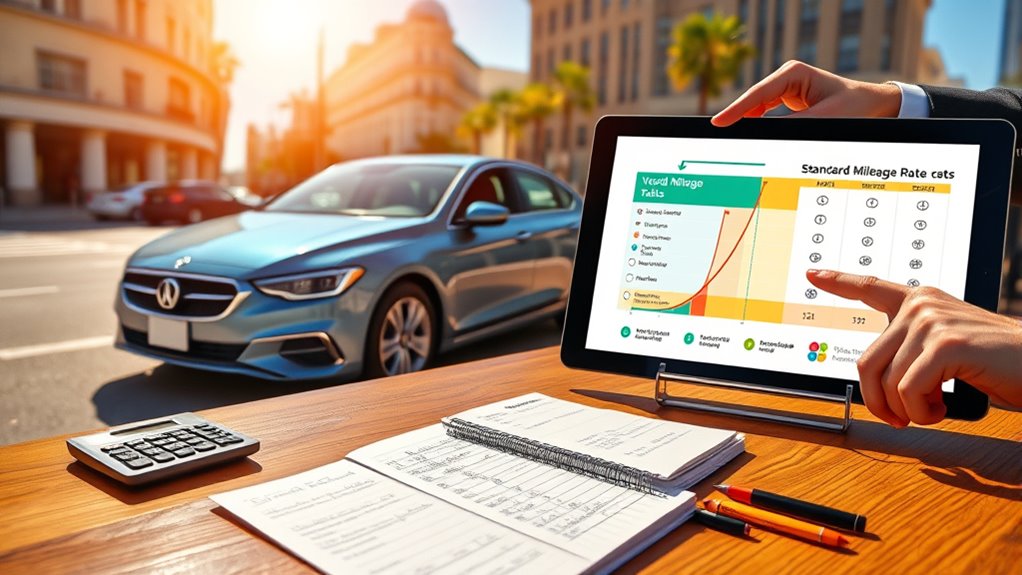When deducting vehicle expenses, you can choose between the standard mileage method or actual costs. The mileage method is simpler—just track business miles and multiply by the IRS rate—while the actual costs method requires detailed documentation of all expenses like fuel, repairs, and insurance. Your choice depends on your driving habits and expenses; if you keep good records, you might find one method more beneficial than the other. Learn more about how to make the best choice.
Key Takeaways
- The standard mileage method simplifies deductions by multiplying business miles by IRS rates, requiring less detailed record-keeping.
- Actual costs method involves tracking all vehicle expenses, such as fuel, repairs, and depreciation, for potentially higher deductions.
- Choose the mileage method for simplicity and lower expenses; opt for actual costs if expenses are high or include significant repairs.
- Accurate record-keeping and documentation are essential for both methods to ensure IRS compliance and audit readiness.
- Regularly evaluate which method offers the greater deduction based on your vehicle usage and expenses.

If you use your vehicle for work, you may be able to deduct certain expenses on your tax return. This can substantially reduce your taxable income, but it’s essential to understand your options: the standard mileage method versus the actual costs method. Each approach requires careful record-keeping and proper tax documentation to guarantee you maximize your deductions while staying compliant with IRS rules.
Using your vehicle for work allows potential tax deductions; choose between standard mileage or actual costs for maximum benefits.
When managing a fleet of vehicles or just a single work vehicle, fleet management becomes a key factor in choosing the best deduction method. If you opt for the standard mileage rate, you simply track your business miles driven during the year and multiply that by the IRS-approved rate, which covers depreciation, maintenance, fuel, and other costs. This method is straightforward and requires less detailed record-keeping. However, it’s imperative to keep an accurate log of your miles driven for work, ideally using a mileage tracking app or a detailed logbook. Proper tax documentation guarantees that you can substantiate your mileage claims if audited and that you’re following IRS rules.
On the other hand, the actual costs method involves tracking all expenses directly related to your vehicle’s operation. This includes fuel, repairs, maintenance, insurance, registration, depreciation, and even lease payments. Because this method involves detailed expense tracking, good record-keeping is essential. You need to keep receipts, invoices, and other supporting documents to substantiate each expense claimed. If you manage multiple vehicles, effective fleet management becomes even more critical, as it simplifies the process of allocating costs accurately across your fleet. You’ll need to maintain comprehensive tax documentation to support your deduction calculations and to differentiate between personal and business use.
Choosing between these methods depends on your specific circumstances. The standard mileage deduction is easier and often more advantageous for those with lower vehicle expenses or simple usage patterns. Conversely, if your vehicle costs are high, or you have significant maintenance and repair bills, the actual costs method might yield larger deductions. Whichever route you take, staying organized with your tax documentation is essential to avoid potential issues during an audit. Regularly updating your records and knowing the IRS guidelines will help guarantee you get the maximum deduction you’re entitled to and keep your fleet management process smooth and compliant.
Frequently Asked Questions
Can I Switch Between Standard Mileage and Actual Costs Each Year?
Yes, you can switch methods each year, but you need to follow specific recordkeeping requirements. When switching between standard mileage and actual costs, you must keep detailed records of your vehicle expenses and usage. For example, if you switch from standard mileage to actual costs, you may need to recapture some deductions. Always guarantee your records are accurate and consistent to comply with IRS rules and avoid issues during audits.
What Records Are Necessary to Support Vehicle Expense Deductions?
Think of your records as the roadmap to your deductions. You need detailed logs of your vehicle’s miles driven for business, plus receipts for vehicle maintenance and insurance documentation. Keep track of all expenses and dates, including repairs, fuel, and insurance payments. These records prove your deductions are legitimate and accurate, turning your expenses into a clear path to maximize your tax benefits.
Are Electric Vehicles Eligible for the Standard Mileage Rate?
Yes, electric vehicles (EVs) are eligible for the standard mileage rate, but only if they’re not qualifying for special electric vehicle incentives. You can also take advantage of EV charging deductions if you track your expenses. Keep detailed records of your mileage and charging costs, as this helps maximize your deductions. Remember, incentives like tax credits don’t affect your mileage deduction eligibility, but they can lower your overall vehicle costs.
How Does Commuting to Work Impact Vehicle Expense Deductions?
When you commute to work, you can’t deduct your regular travel costs like parking fees or toll expenses. Instead, you deduct expenses for business-related trips outside your normal commute, such as visiting clients or going to meetings. Your daily commute is considered personal, so it isn’t deductible. Keep track of your parking and tolls for work trips to accurately report any eligible expenses and maximize your deductions.
Can I Deduct Vehicle Expenses for a Leased Car?
Yes, you can deduct vehicle expenses for a leased car if you use it for work purposes. Leasing deductions typically include the lease payments, fuel, and maintenance costs. If you have an electric vehicle, you may also qualify for additional benefits, like electric vehicle eligibility credits. Just remember, only the business-related portion of your lease and expenses is deductible, so keep detailed records to support your claim.
Conclusion
So, next time you hit the road, remember that choosing between standard mileage and actual costs might just save you more than you think. It’s funny how a simple decision can make such a difference, isn’t it? Take a moment to review your trips and expenses—what seems minor could add up to big savings come tax time. After all, staying informed helps you make smarter choices, turning everyday driving into valuable deductions.









